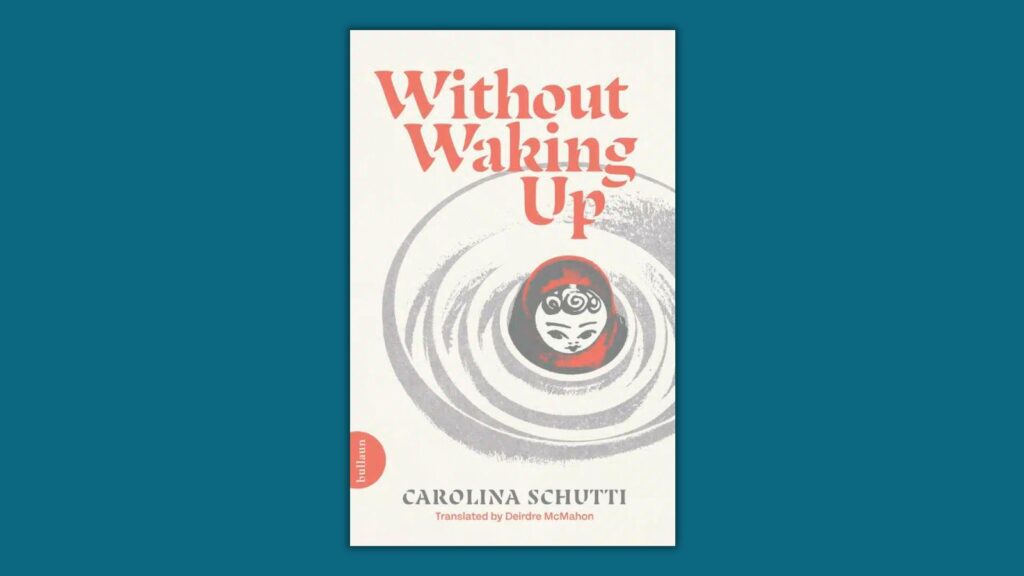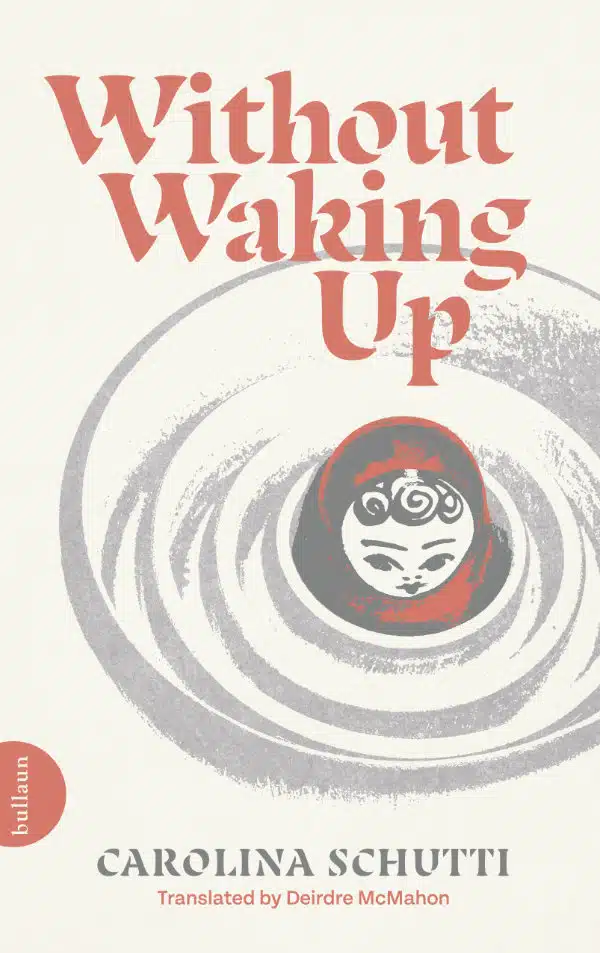
Without Waking Up|Carolina Schutti|trans Deirdre McMahon|Bullaun Press
Without Waking Up—a truly affecting novel of great intellectual and emotional subtlety
by Eoghan Smith
Without Waking Up is the translated title of acclaimed Austrian author Carolina Schutti’s 2012 novel, einmal muss ich über weiches Gras gelaufen sein (‘I must have walked on soft grass once’), which went on to win the European Union Prize for Literature in 2015.
It is the second book produced by the newest Irish publishing house, Sligo-based Bullaun Press, whose mission is to provide more translated works for an Irish readership. Now, some eleven years after it first appeared, it has been masterfully rendered into English by Deirdre McMahon.
Without Waking Up runs to just 129 pages. While this length would typically fit the description of a novella, the scope of the book is more fitting of a novel, and indeed, one senses that it is not that the story is short; instead, there is a much vaster story being told of which we see just a fraction.
In beautifully crisp language, we observe dispersed scenes of Maja’s parentless girlhood and her struggles with a new tongue
The narrative focuses on Maja, who we first meet as a young girl in an un-named German speaking European country, where she is being raised by her aloof aunt, through to her journey back to her grandmother’s homeland in Belarus as an adult in search of her origins. In beautifully crisp language, we observe dispersed scenes of Maja’s parentless girlhood and her struggles with a new tongue (‘I lost my language along with my mother’), her awkward adolescence, sexual awakening and young womanhood, her relationships with men, and, later, her motherhood.
Dislocation
The novel opens with a depiction of Maja’s tender friendship with Marek, an older, Polish war refugee, of which Maja’s aunt disapproves. Marek’s mysterious past opens an aperture into the novel’s central theme: the dislocation of identity. The unmoorings of past trauma are to be concealed and undiscussed:
“Everyone knew what had happened, but nobody could explain why Marek had moved to this particular village as a young man and why he hadn’t returned home after the war. Forget all that now, Marek had said, wiping his eyes, forget it.”
the novel is also deeply concerned with the disintegration of memory
Marek’s former refugee status is an early signifier in the novel of Maja’s own enduring personal dislocation, one that will shape her self-understanding and search for identity. The novel is also deeply concerned with the disintegration of memory, and how such disintegration erodes a sense of continuity. In one scene, Marek asks Maja to tell him the stories that are printed on her beloved Babushka dolls, which are symbols of histories hidden within histories: “I thought they reminded him of the stories of his childhood, because they were similar, but perhaps he only wanted to prevent them fading from my memory.” Such pathos in Schutti’s narrative is decanted with remarkable, sharp economy:
“When Marek died, I no longer lived in the village…His life had not lasted a hundred years, but who can say how much life a person gets. My aunt died before him. She reached the age of eighty-three and nobody needs to worry about her grave” (sic).
Yet if the language is exact, Without Waking Up is also a novel without co-ordinates, deliberately so. Time and place are not stated: we are in Europe, but where, exactly, and when? The reader is shuffled between scenes without immediate connection, a device that creates large gaps in the temporal flow of the narrative – we move from Maja’s childhood to adolescence to adulthood without much indication that this transformation has happened.
one feels that the selection of events, these snapshots of memory, are infused with a plenitude of meanings that accrete into some monumental whole
The size of these gaps in time is unspecified: the narrative can leap forward hours or years, with the effect that the reader can follow the general sequence of Maja’s life but cannot predict where we will next land. Sometimes the scenes appear to be important events, such as her first sexual encounter or the burgeoning of her relationship with the best friend of her current boyfriend; at other times, they seem inconsequential, such as deciding what clothes to wear or how to spend a free day bicycling around an un-named city. And yet one feels that the selection of events, these snapshots of memory, are infused with a plenitude of meanings that accrete into some monumental whole.
Impressions of a life
Maja’s dislocations are mirrored in the narration, which switches between the first and third person. The dominant tense is the present, but the narrative also slips between the simple and perfect past tenses. Chapters are broken into short sections, which appear like patches of memory. New characters will suddenly appear who have obvious significance in the overall life of Maja but who the reader will not previously have been aware of.
Life is lived, remembered and understood through language
By degrees, Maja’s story obtains a shape, like a figure emerging out of a fog. On the page too there are gaps between paragraphs; by the final chapter, as Maja journeys home to the land of her grandmother from where her family came, these literal gaps grow larger than the surrounding text as her sense of dislocation increases. We see impressions of a life rather than its totality, but understand that in memory, the totality of life is a series of impressions. Life is lived, remembered and understood through language: “Where are my first sentences, I ask myself…they’re not even in memory, at least not in mine.”
Jean-Paul Sartre once wrote that in The Stranger, Albert Camus’ sentences were like islands that stood apart from each other in seeming isolation but were in fact profoundly connected. Although Schutti’s technique is different to Camus’ – Camus wants to create the atmosphere of the absurd where Schutti is interested in manifestations of displacement – the feeling created is not dissimilar. It is a feeling that while the sequences of time passing are discernible, there is some unquantifiable absence in the entirety of events that the reader’s imagination cannot complete.
The impossibility of a language adequate to the fragmentation of memory is captured through the precision of Schutti’s prose
If this all sounds complicated, it is not. At the heart of Without Waking Up is a relatively simple story of a person struggling to understand who they are and where they come from. It is a truly affecting novel of great intellectual and emotional subtlety, beautifully translated. The impossibility of a language adequate to the fragmentation of memory is captured through the precision of Schutti’s prose. In an early passage, where Schutti deftly switches the narrative perspective again, we see Marek waiting for Maja, who has not arrived:
“It is a pity that Maja did not come. But tomorrow, perhaps. She will swing her legs and wait for raspberry juice and a story. And when you’re grown up Maja, you must remember that Marek waited in his house for you, he watched out to the fence and beyond; he always made you deep-red raspberry juice. Maja, remember that; you must remember.”
This urging to remember – to maintain in the mind the fragile bond between past and present – appears to us as an ethical imperative that speaks to a common European experience. Without Waking Up is a brilliant work of fiction, expertly translated by McMahon. One hopes that Bullaun Press will bring out more works of such high standard to the English language reading public.

Eoghan Smith is the author of The Failing Heart (2018), A Provincial Death (2022), and his latest novella, A Mind of Winter is out now with Dedalus Books (October 2023).












